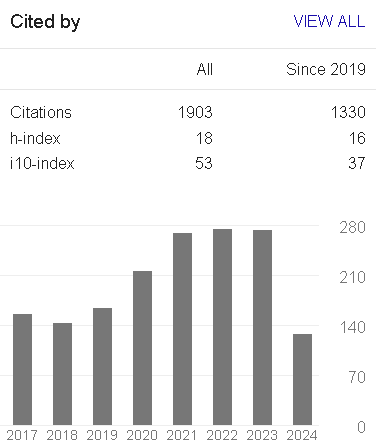Measurement, analysis and data collection in the programming LabVIEW
Keywords:
LabVIEW, processor, monitoringAbstract
The work deals with handling of systems modelling, simulation knowledge and the processor and particular processor core overload issue. Programming environment LabVIEW was designed for this field of measuring, analysis and data acquisition. It is a highly productive development environment that engineers and scientists use for graphical programming and unprecedented hardware integration. The environment is predominantly designed to simulation, managing and parameter and other factor measuring. By this graphical program we are able to analyses and consequently display the results on the output interconnection. The environment LabVIEW is applied to the computer processor overload issue in this work. The result is direct technological virtual instrumentation of overload representation in the real time. Finally this instrumentation is more simple, transparent and especially more effective than a foregoing hardware solutions. By the block diagram design it is possible to monitor the processor and its core overload. Consequently these measurements are recorded into the text file and display writer in the percentage value in certain time interval.
References
Z. Balogh, and C. Klimeš, “Modelling of education process in LMS using Petri nets structure,” Proceedings of the IADIS International Conference e-Learning 2010, Part of the IADIS Multi Conference on Computer Science and Information Systems 2010, MCCSIS 2010, pp.289-291.
Z. Balogh, and M. Turčáni, 2011, “Possibilities of modelling webbased education using IF-THEN rules and fuzzy petri nets in LMS,” Communications in Computer and Information Science 251 CCIS (PART 1) , pp. 93-106.
S. Koprda, Z. Balogh and M. Turčáni, “Fuzzy Control Rules Base Design,” 2011 5th International Conference on Application of Information and Communication Technologies, AICT 2011 , art. no. 6110962.
A. Backlund, “The definition of system,” Kybernetes, Vol. 29, No. 4, 2000, pp.444–451.
P. Peringer, “Modelování a simulace,” Fakulta informačních technologií: Vysoké učení technické v Brně, 2006.
J. Fejfar, J. Šťastný and M. Cepl, “Time series classification using k-Nearest neighbours, Multilayer Perceptronand Learning Vector Quantization algorithms,” Acta Universitatis Agriculturae et Silviculturae Mendelianae Brunensis 60 (2), 2012, pp.69-72.
I. Křivý and E. Kindler, “Simulace a modelování,” Učební texty Ostravské university, Přírodovědecká fakulta: Ostravská univerzita, 2001
D. Klocoková, “Integration of heuristics elements in the web-based learning environment: Experimental evaluation and usage analysis,” Procedia - Social and Behavioral Sciences, ISSN 1877-0428, 2011, vol. 15, pp.1010-1014.
D. Klocoková, and Munk, M. “Usage analysis in the web-based distance learning environment in a foreign language education: Case study,” Procedia - Social and Behavioral Sciences, ISSN 1877-0428, 2011, vol. 15, p. 993-997.
H. Xiao, “A metamodel for the notation of graphical modeling languages,” Computer Software and Applications Conference, COMPSAC, Vol.1, 2007, pp.219-224.
CH. Chung, “Simulation Modeling Handbook, A Practical Approach,” CRC Press, Boca Raton, 2003.
R. G. Sargent, “Verification and Validation of Simulation Models,”Proceedings of the 2003 Winter Simulation Conference, 2003, pp.37-48.
K. Jensen, “Coloured Petri Nets,” Basic Concepts, Analysis Methods and Practical Use, Vol.2, Springer-Verlag, 1997.
J. Ţídek, “Grafické programování ve vývojovém prostředí LabVIEW,” Ostrava: Vysoká škola báňská v Ostrave, 2002.
Z. Balogh “Modelovanie, simulácia a riadenie procesov s vyuţitím grafického programovacieho balíka LabVIEW,” Inovácia výskumu
katedier informatiky Nitra : UKF, 2009, ISBN 978-80-8094-579-4, pp. 11-17.
P. Horovčák, and M. Roškanin, “Metódy monitorovania technologických procesov s vyuţitím www technológií,” Zborník referátov konferencie Automatizácia a počítače v riadení procesov, TU Zvolen, 1998, pp.15-29.
I. Leššo, D. Baluch, P. Horovčák, J. Futó, and J. Budiš, “Monitorovací systém vŕtacej súpravy pre účely riadenia,” Zborník referátov 9. medzinárodnej baníckej konferencie, Riadenie procesov získavania a spracovania surovín, FBERG TU Košice 1997, pp.91-96.
P. Švec, and M. Munk, “IPv4/IPv6 performance analysis: Transport layer protocol impact to transmission time,” 2011 International Conference on Internet Technology and Applications, iTAP 2011 - Proceedings, art. no. 6006335.
Downloads
Published
How to Cite
Issue
Section
License
Copyright (c) 2014 COMPUSOFT: An International Journal of Advanced Computer Technology

This work is licensed under a Creative Commons Attribution 4.0 International License.
©2023. COMPUSOFT: AN INTERNATIONAL OF ADVANCED COMPUTER TECHNOLOGY by COMPUSOFT PUBLICATION is licensed under a Creative Commons Attribution 4.0 International License. Based on a work at COMPUSOFT: AN INTERNATIONAL OF ADVANCED COMPUTER TECHNOLOGY. Permissions beyond the scope of this license may be available at Creative Commons Attribution 4.0 International Public License.


